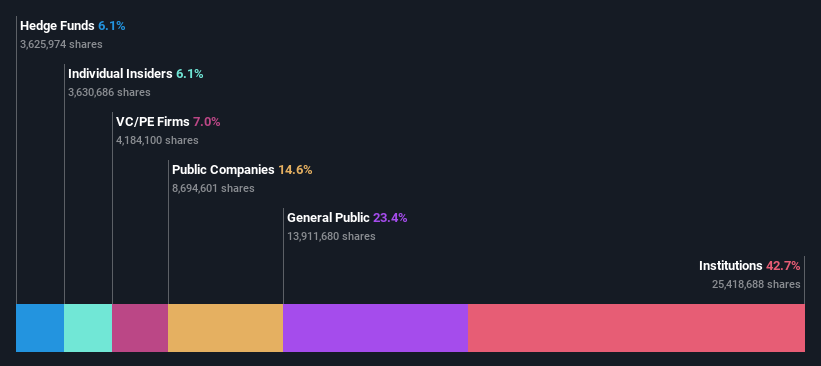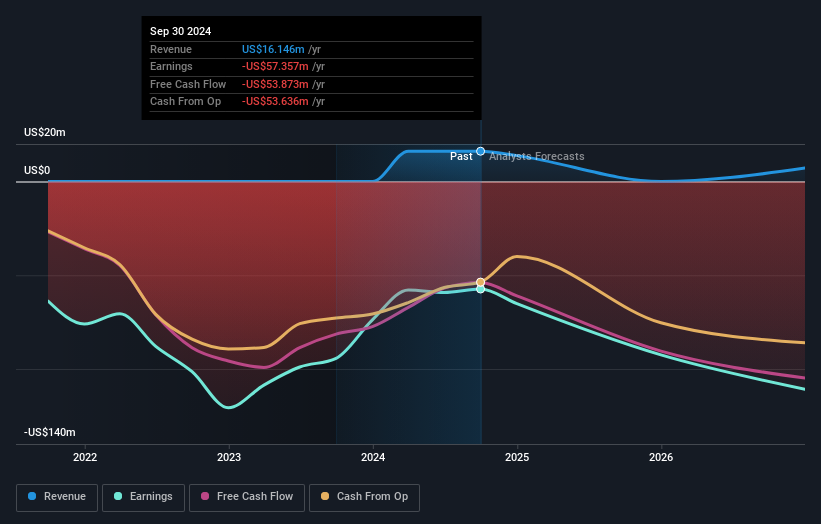- United States
- /
- Biotech
- /
- NasdaqGS:PYXS
Institutional investors in Pyxis Oncology, Inc. (NASDAQ:PYXS) lost 11% last week but have reaped the benefits of longer-term growth

Key Insights
- Significantly high institutional ownership implies Pyxis Oncology's stock price is sensitive to their trading actions
- 50% of the business is held by the top 9 shareholders
- Ownership research along with analyst forecasts data help provide a good understanding of opportunities in a stock
Every investor in Pyxis Oncology, Inc. (NASDAQ:PYXS) should be aware of the most powerful shareholder groups. And the group that holds the biggest piece of the pie are institutions with 43% ownership. In other words, the group stands to gain the most (or lose the most) from their investment into the company.
No shareholder likes losing money on their investments, especially institutional investors who saw their holdings drop 11% in value last week. However, the 173% one-year return to shareholders may have helped lessen their pain. They should, however, be mindful of further losses in the future.
In the chart below, we zoom in on the different ownership groups of Pyxis Oncology.
See our latest analysis for Pyxis Oncology

What Does The Institutional Ownership Tell Us About Pyxis Oncology?
Institutional investors commonly compare their own returns to the returns of a commonly followed index. So they generally do consider buying larger companies that are included in the relevant benchmark index.
We can see that Pyxis Oncology does have institutional investors; and they hold a good portion of the company's stock. This implies the analysts working for those institutions have looked at the stock and they like it. But just like anyone else, they could be wrong. It is not uncommon to see a big share price drop if two large institutional investors try to sell out of a stock at the same time. So it is worth checking the past earnings trajectory of Pyxis Oncology, (below). Of course, keep in mind that there are other factors to consider, too.

It would appear that 6.1% of Pyxis Oncology shares are controlled by hedge funds. That's interesting, because hedge funds can be quite active and activist. Many look for medium term catalysts that will drive the share price higher. The company's largest shareholder is Pfizer Inc., with ownership of 10%. Ridgeback Capital Management LLC is the second largest shareholder owning 7.3% of common stock, and Deep Track Capital, LP holds about 7.0% of the company stock. Furthermore, CEO Lara Sullivan is the owner of 3.1% of the company's shares.
On further inspection, we found that more than half the company's shares are owned by the top 9 shareholders, suggesting that the interests of the larger shareholders are balanced out to an extent by the smaller ones.
While studying institutional ownership for a company can add value to your research, it is also a good practice to research analyst recommendations to get a deeper understand of a stock's expected performance. There are plenty of analysts covering the stock, so it might be worth seeing what they are forecasting, too.
Insider Ownership Of Pyxis Oncology
While the precise definition of an insider can be subjective, almost everyone considers board members to be insiders. The company management answer to the board and the latter should represent the interests of shareholders. Notably, sometimes top-level managers are on the board themselves.
Insider ownership is positive when it signals leadership are thinking like the true owners of the company. However, high insider ownership can also give immense power to a small group within the company. This can be negative in some circumstances.
We can see that insiders own shares in Pyxis Oncology, Inc.. As individuals, the insiders collectively own US$15m worth of the US$247m company. This shows at least some alignment. You can click here to see if those insiders have been buying or selling.
General Public Ownership
With a 23% ownership, the general public, mostly comprising of individual investors, have some degree of sway over Pyxis Oncology. While this size of ownership may not be enough to sway a policy decision in their favour, they can still make a collective impact on company policies.
Private Equity Ownership
Private equity firms hold a 7.0% stake in Pyxis Oncology. This suggests they can be influential in key policy decisions. Sometimes we see private equity stick around for the long term, but generally speaking they have a shorter investment horizon and -- as the name suggests -- don't invest in public companies much. After some time they may look to sell and redeploy capital elsewhere.
Public Company Ownership
It appears to us that public companies own 15% of Pyxis Oncology. It's hard to say for sure but this suggests they have entwined business interests. This might be a strategic stake, so it's worth watching this space for changes in ownership.
Next Steps:
It's always worth thinking about the different groups who own shares in a company. But to understand Pyxis Oncology better, we need to consider many other factors. Case in point: We've spotted 3 warning signs for Pyxis Oncology you should be aware of, and 1 of them doesn't sit too well with us.
If you are like me, you may want to think about whether this company will grow or shrink. Luckily, you can check this free report showing analyst forecasts for its future.
NB: Figures in this article are calculated using data from the last twelve months, which refer to the 12-month period ending on the last date of the month the financial statement is dated. This may not be consistent with full year annual report figures.
New: Manage All Your Stock Portfolios in One Place
We've created the ultimate portfolio companion for stock investors, and it's free.
• Connect an unlimited number of Portfolios and see your total in one currency
• Be alerted to new Warning Signs or Risks via email or mobile
• Track the Fair Value of your stocks
Have feedback on this article? Concerned about the content? Get in touch with us directly. Alternatively, email editorial-team (at) simplywallst.com.
This article by Simply Wall St is general in nature. We provide commentary based on historical data and analyst forecasts only using an unbiased methodology and our articles are not intended to be financial advice. It does not constitute a recommendation to buy or sell any stock, and does not take account of your objectives, or your financial situation. We aim to bring you long-term focused analysis driven by fundamental data. Note that our analysis may not factor in the latest price-sensitive company announcements or qualitative material. Simply Wall St has no position in any stocks mentioned.
About NasdaqGS:PYXS
Pyxis Oncology
A clinical stage company, engages in the development of therapeutics to treat solid tumors.
Flawless balance sheet slight.
Similar Companies
Market Insights
Community Narratives



